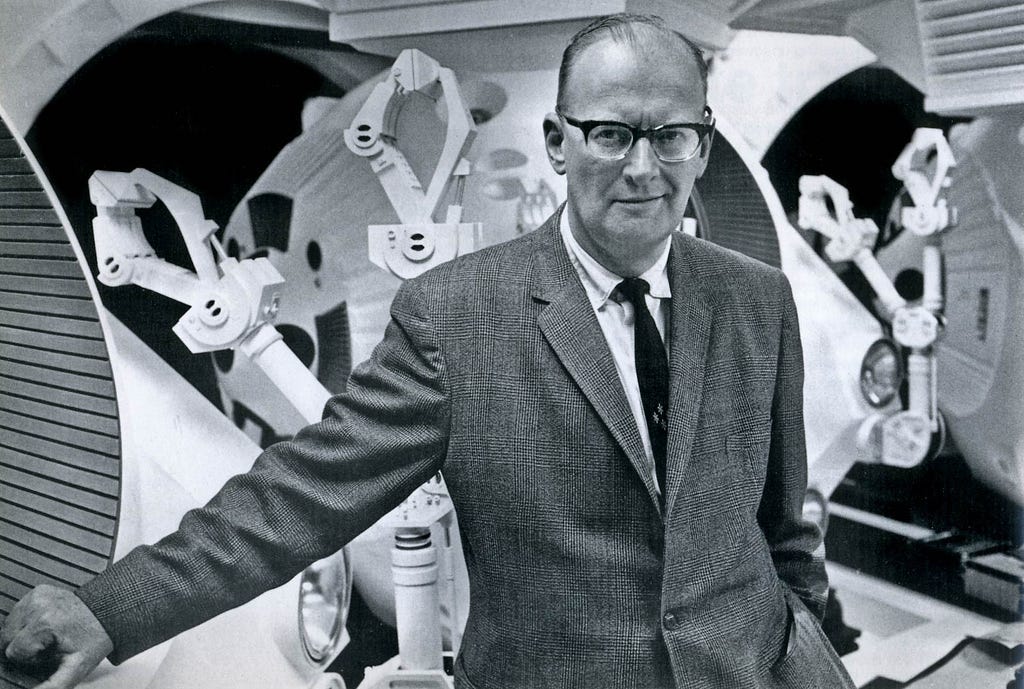The Plausibility Problem
Is it Science Fiction or Fantasy? What’s the difference anyway?
In my time I’ve written a lot of fantasy and some science fiction. But over the past year I’ve really struggled trying to begin a new SF series—a space opera to be specific. I kept running into the dreaded problem of plausibility.
Basically, with fantasy I can just follow my inspiration. Any plot twist or background idea that appears can be explained (if I do it well) as “magic.” But ideas in science fiction have to conform to known science.
Or do they? Or to what extent do they? At what point does a story cross the line from science fiction into fantasy?
I call this the Plausibility Problem.
Clarke’s Laws
To analyze, I did some research, starting with Arthur C. Clarke’s famous “Three Laws of Science Fiction.”1

The most often quoted is the Third Law, which you probably have heard and which is particularly relevant to my dilemma: “Any sufficiently advanced technology is indistinguishable from magic.”
Makes a lot of sense, right?
So, based on the Third Law, a writer might justify using any “magical” idea in a science fiction story and claim the Clarke’s Third Law defense: “It’s really just science that we don’t understand yet.”
To analyze further (and maybe shore up my defense), I also looked at the Second Law, which states: “The only way of discovering the limits of the possible is to venture a little way past them into the impossible.”
Regarding the Second Law, the article linked to above says:
(Clarke) had written this in the context of a list of inventions and discoveries that he had classified as either expected (including automobiles, telephones, robots, “flying machines”) or unexpected (x-rays, nuclear energy, photography, quantum mechanics).
Expected vs. unexpected discoveries. I found this intriguing and relevant to my problem.
Barnes’ Math and Magic
Further research brought me to an essay titled “How to Build a Future” by SF author John Barnes.2 A book description on Amazon calls this “the definitive modern essay on the construction of science-fictional plausibility”3 and boy, I can see why.
Barnes, who has worked in systems analysis and statistics4 takes us step-by-step through a detailed example of projecting science, technology, and society into a fictional future. He does this using historical data on how these areas have evolved in the past, complete with math and charts.
What especially caught my eye is that he finds that these science and tech changes have occurred in “surges,” and that:
Each new surge is 90 percent what you might have expected from the last one, plus 10 percent magic (in its Clarke’s Law sense.)5
Taking this further, Barnes postulates a succession of surges over the next centuries, leading to his invented future. Doing the math—10 percent plus 10 percent and so on for each surge—this means that more and more of the science and tech in the not-so-distant future becomes “not comprehensible” to our current understanding.
In other words, magic!
What Do the People Say?
To extend my analysis, I did some market research. Which means I looked up discussions related to the issue on both Facebook and Reddit.
While I found lots and lots of opinions about what constitutes hard science fiction, soft science fiction, and fantasy, one consistent theme emerged. Most readers simply don’t worry about the Plausibility Problem as much as I did. They mainly just want a good story.
Some representative quotes:
There's a lot of grey in-between. It's subjective.
Base it on good science, not necessarily accurate science. What I mean is be consistent with the principles you use and have an explanation for how things work, even if that explanation is never given or used in the work.
IMO, explicit explanations are not required. And there is a very thin and murky line between science and magic, partly depending on your world view.
Problem Solved
All of this analysis made me feel much better about the Plausibility Problem.
Rather liberated, actually. I was able to start writing science fiction stories again without the internal critic stopping me in my tracks by picking every idea to pieces.
So, look out, space opera, I’m coming for you!

“Clarke’s Three Laws” NewScientist at https://www.newscientist.com/definition/clarkes-three-laws/
“How to Build a Future” by John Barnes. Originally published in Analog Science Fiction/Sciene Fact, March 1990. Reprinted in the Writer’s Chapbook Series by Pulphouse Publishing (1991) and in Barne’s 1999 Collection, Apostrophes & Apocalypses.
How to Build a Future, Pulphouse Writer’s Chapbook edition, page 14.



I have thought about this fiction/sci-fi dichotomy a lot and come to my own conclusions… I probably should have done more research, as you did fantastically here. Great thoughts.
I like this question, Jack. I’m thinking now the ability to bridge multiple categories is a priceless effort. Good for the soul. AND for the mind!